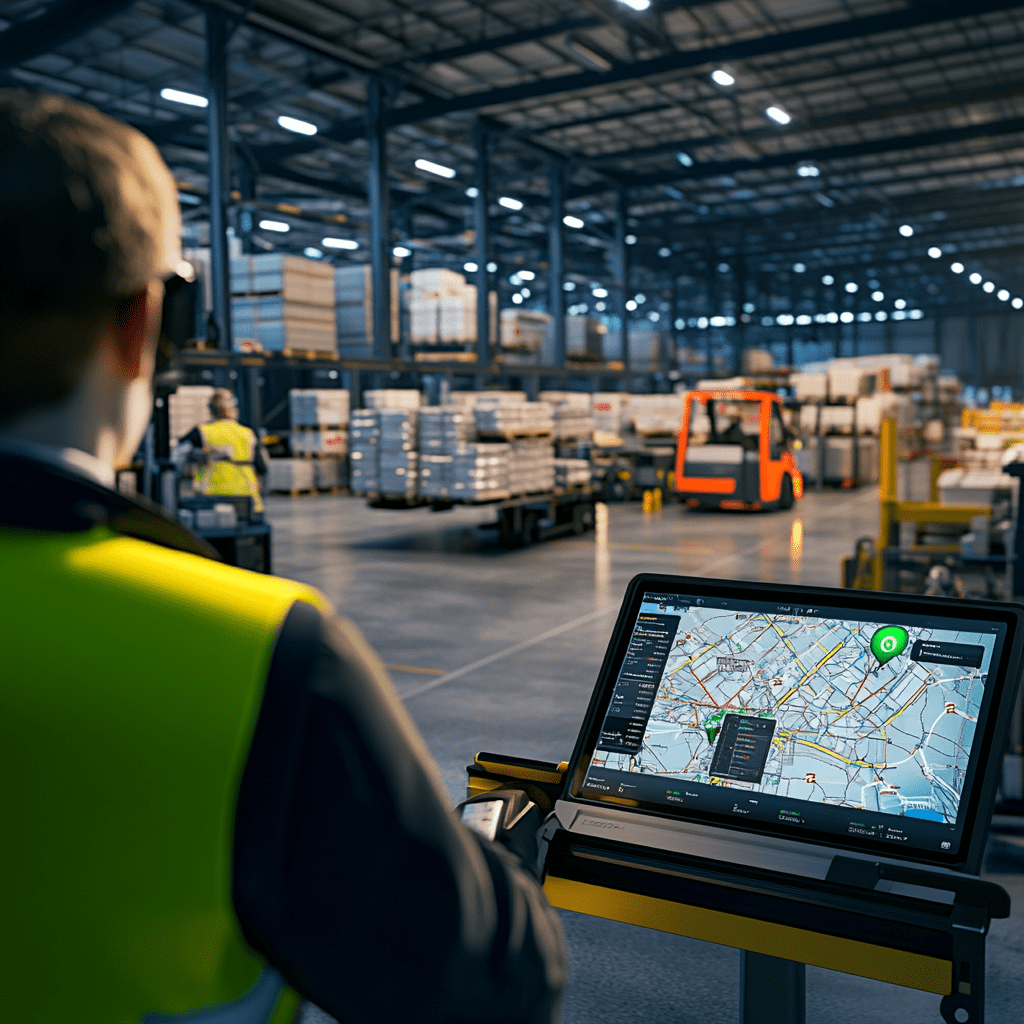Supply Chain Management (SCM): How It Works & Why It’s Important

It was a routine morning—until a supply chain manager at one of the world’s largest aircraft manufacturers realized a critical problem. On the final assembly line, workers were waiting for a set of high-priority components needed to complete an aircraft build. Every minute those parts were delayed meant a potential disruption in production, slowing down an assembly process that was already operating at maximum capacity.
In an industry where aircraft orders are placed nearly a decade in advance, every delay has high-stakes consequences. The company is in direct competition with its biggest rival to produce more aircraft per month, aiming to increase production rates from six to eight aircraft per month—and beyond. Any inefficiency in delivering parts to the final assembly line adds time to an already complex process, making it harder to meet growing demand.
That’s where our technology at GPX Intelligence made the difference.
By implementing a sophisticated network of Bluetooth tracking technology across their container facility and every phase of the final assembly area, we provided minute-by-minute tracking of high-priority parts—with accuracy down to six square feet. Real-time alerts notified assembly teams the moment parts were requested, moved, or misplaced, ensuring no time was wasted searching for missing components.
Additionally, our customized data dashboards provided week-over-week analytics on efficiency and dwell time within the final delivery process. Logistics and production managers used this data to make real-time operational adjustments, eliminating bottlenecks and reducing overall assembly time.
The impact? A massive increase in efficiency and accountability across the entire supply chain. The company is now expanding this real-time visibility solution to other product lines, transforming how materials are managed for nearly every part of their production process.
Recent events, such as the 2024 East Coast automotive strike, have underscored the fragility of supply chains. According to the Alliance for Automotive Innovation, “A protracted strike will be debilitating to the auto supply chain and set off economic and national security ripples across the country.” These disruptions highlight the necessity for businesses to adopt resilient and agile SCM practices.
The rise of IoT, AI, and automation is transforming supply chain management, enabling businesses to predict disruptions, optimize logistics, and enhance decision-making in real-time. AI-driven predictive analytics help companies mitigate risks, fine-tune inventory, and streamline operations in an increasingly volatile trade environment. SCM is no longer just about efficiency—it’s about resilience and agility. Businesses that invest in real-time tracking, cloud-based visibility, and automation will stay ahead, navigating global trade shifts, geopolitical tensions, and evolving consumer demands with confidence.
What Is Supply Chain Management (SCM)?
Before diving into the complexities, let’s start with the fundamentals. Supply Chain Management (SCM) encompasses every step required to move a product or service from origin to customer. It involves the orchestration of goods, information, and finances, ensuring efficiency and cost-effectiveness at every stage.
SCM isn’t just a logistics function—it’s a strategic advantage that helps businesses streamline operations, reduce costs, and improve service delivery. Companies that master supply chain management can adapt faster to disruptions, optimize inventory, and create seamless customer experiences.
Supply Chain Management Meaning and Its Role in Business
At its core, SCM is about integration and optimization. It breaks down silos between procurement, manufacturing, logistics, and customer service, creating a seamless flow from raw material sourcing to final delivery.
Think of SCM like an orchestra conductor, ensuring every department plays its part in harmony. Without proper coordination, inefficiencies arise—leading to higher costs, production delays, and dissatisfied customers.
A well-executed supply chain strategy allows businesses to:
- Enhance operational efficiency by optimizing procurement, production, and logistics.
- Improve profitability by reducing waste, minimizing delays, and controlling costs.
- Boost customer satisfaction through faster delivery times and accurate order fulfillment.
- Increase agility to respond quickly to market fluctuations, regulatory changes, or supply chain disruptions.
- Every industry—from manufacturing and retail to healthcare and technology—depends on SCM to remain competitive and resilient.
Key Components of Supply Chain Management
A smooth-running supply chain is all about getting the right stuff to the right place at the right time—without wasting money or resources. It starts with planning and sourcing, where AI-driven forecasting helps businesses stay ahead of demand while locking in reliable suppliers who won’t leave them hanging. Then comes manufacturing and logistics, where automation, IoT, and GPS tracking keep production efficient and deliveries on schedule. Smart routing and real-time tracking help businesses dodge delays, cut fuel costs, and keep customers happy.
Then there’s warehousing, inventory management, and last-mile delivery—the real battleground. Companies rely on RFID, AI-driven fulfillment, and faster shipping solutions to move products quickly. The final stretch, last-mile delivery, is the trickiest, with businesses turning to drones and same-day shipping to meet sky-high customer expectations. And let’s not forget returns—no one loves them, but handling them efficiently (and sustainably) keeps customers coming back. When all these parts click into place, businesses save money, reduce waste, and keep the supply chain running like a well-oiled machine.
Why SCM Is Essential for Modern Businesses
A strong supply chain isn’t just about moving products—it’s about speed, efficiency, and staying ahead of the competition. Customers expect fast, seamless deliveries, and businesses that nail logistics and real-time tracking build loyalty while cutting costs. Automation, AI, and smart routing save millions by eliminating waste and streamlining operations.
But it’s not just about efficiency—it’s about resilience. COVID-19 proved how quickly supply chains can unravel, with factory shutdowns, labor shortages, and shipping delays crippling global trade. Add in weather disruptions, trade restrictions, and raw material shortages, and the risks multiply. Companies that invest in real-time monitoring and AI-driven risk assessments can pivot fast, avoiding costly delays. And with sustainability and compliance under the spotlight, businesses are leaning toward ethical sourcing and eco-friendly logistics to meet customer and regulatory demands. A well-managed supply chain fuels growth, protects profits, and keeps businesses in the game—no matter what gets thrown their way.

The Importance of Real-Time Visibility in SCM
Real-time visibility ensures businesses have full control over their supply chain operations. Without it, delays, misplaced shipments, and inefficiencies can disrupt productivity and profitability. By integrating GPS tracking, IoT sensors, and real-time analytics, companies can track goods, monitor inventory, and anticipate potential bottlenecks before they escalate. This level of transparency allows for faster decision-making, improved coordination, and greater efficiency across logistics, warehousing, and transportation.
Overcoming the Lack of Real-Time Visibility with GPS Tracking
Limited visibility in traditional supply chains creates uncertainty at every stage of the process. GPS tracking eliminates these blind spots by providing live location data on shipments, vehicles, and assets. Companies can monitor movement in real-time, set geofences to trigger alerts when shipments deviate from their expected routes, and proactively respond to delays or security threats.
Beyond tracking, GPS solutions enhance route optimization, improve estimated delivery times, and reduce fuel costs by identifying the most efficient paths. This level of predictability and accuracy strengthens customer confidence and improves overall supply chain performance.
How Inventory Management in Supply Chain Benefits from Visibility
Accurate inventory tracking is essential for balancing supply and demand. Without real-time insights, businesses risk stockouts, overstocking, or supply chain bottlenecks that impact profitability. By using RFID tags, barcode scanning, and AI-driven demand forecasting, companies can monitor stock levels across multiple locations, ensuring efficient replenishment and reducing waste.
With cloud-based inventory management systems, teams gain instant access to stock levels, order statuses, and warehouse movements from anywhere. This transparency streamlines supply chain coordination, cuts down on errors, and improves overall operational efficiency.
The Role of IoT in Supply Chain Management Optimization
IoT-enabled devices are revolutionizing supply chain management by providing continuous data streams from products, fleets, and warehouses. Sensors track temperature, humidity, shock impact, and movement, ensuring real-time quality control for sensitive goods like pharmaceuticals and perishable foods.
Beyond monitoring, IoT enhances automation by enabling predictive maintenance on equipment and vehicles, preventing unexpected breakdowns and costly downtime. With connected supply chains, businesses can anticipate issues, optimize asset utilization, and improve overall supply chain resilience.
Common Challenges in Supply Chain Management
Even the most well-structured supply chains face obstacles that can disrupt operations and increase costs. Theft, delays, inefficient routing, and data security threats are just a few of the biggest concerns for businesses today. These challenges not only impact profitability and customer satisfaction but also create vulnerabilities that can ripple through an entire supply network. Leveraging technology like GPS tracking, AI-powered analytics, and blockchain solutions helps companies mitigate risks and keep supply chains running efficiently.
Theft and Loss Prevention with GPS and RFID Tracking
Cargo theft remains a costly issue, with annual losses in the U.S. ranging from $15 billion to $30 billion. Stolen shipments not only create financial setbacks but also disrupt supply chain flow and damage brand trust. GPS tracking provides real-time location data, allowing businesses to monitor assets 24/7 and receive instant alerts if something goes off course. RFID tags add another layer of security by offering granular visibility and tracking individual items at every stage of the supply chain. Companies using RFID-enabled inventory tracking have reported up to a 25% reduction in theft-related losses.
Inefficient Routing and the Cost to Your Business
Wasted miles mean wasted money. A study by the American Transportation Research Institute found that inefficient routing and traffic congestion cost the trucking industry $74.5 billion annually in lost productivity and fuel. Without proper route planning, businesses face higher operational costs, increased vehicle wear and tear, and missed delivery windows. Route optimization software, combined with real-time GPS tracking and AI-driven traffic analysis, helps companies reduce travel time by up to 20%, cut fuel consumption, and improve overall delivery efficiency.
Managing Delivery Delays and Missed Deadlines
Customer expectations for fast, reliable deliveries have never been higher, and delays can be costly. A survey by Project 44 found that 84% of customers are less likely to do business with a company again after a bad delivery experience. Without visibility into shipments, businesses struggle to provide accurate ETAs or notify customers about unexpected delays. Real-time GPS tracking and automated notifications allow companies to proactively manage delivery expectations, reroute shipments when necessary, and improve on-time performance—ultimately increasing customer trust and retention.
Chain-of-Custody Documentation for High-Value Goods
For industries handling pharmaceuticals, electronics, and luxury goods, maintaining a secure and transparent chain of custody is non-negotiable. In pharmaceuticals, for example, regulations require detailed documentation of every transfer and storage condition to ensure patient safety. Blockchain technology, GPS tracking, and IoT-enabled sensors create an immutable, real-time record of every touchpoint in the supply chain. Companies that implement blockchain-based tracking not only prevent counterfeiting but also streamline compliance and reduce liability risks.
Addressing Data Security Concerns in Logistics and Supply Chain Management
As businesses become more reliant on cloud-based SCM platforms, IoT tracking, and AI-driven logistics, cybersecurity risks have skyrocketed. A 2023 IBM report found that the average cost of a data breach has risen to $4.45 million. Supply chains house vast amounts of sensitive data, including customer information, supplier contracts, and financial records, making them prime targets for cyberattacks. Implementing strong encryption protocols, multi-factor authentication, and AI-driven threat detection systems helps businesses protect their data, ensure compliance, and safeguard customer trust.
Innovations in Supply Chain Management Solutions
The supply chain sector is embracing transformative technologies like artificial intelligence (AI), blockchain, and cloud computing to enhance efficiency and transparency. A recent report indicates that approximately 90% of large businesses have experimented with AI in their supply chains, with 29% planning significant investments in the next three years.
Blockchain technology is enhancing supply chain transparency by providing immutable records of transactions, thereby improving traceability and security. This innovation is particularly beneficial in industries where product authenticity and origin are critical.
Cloud-based solutions, such as Microsoft Dynamics 365, offer scalability and real-time data access, enabling seamless integration across various supply chain functions. These platforms facilitate better collaboration among stakeholders and provide the flexibility needed to respond swiftly to market changes.
Enhancing Supply Chain Efficiency with Technology
Technological advancements are pivotal in streamlining supply chain operations. GPS tracking systems provide real-time visibility into the movement of goods, allowing businesses to optimize routes and reduce idle time. This leads to improved efficiency and productivity in logistics operations.
AI-powered forecasting tools analyze vast datasets to predict demand patterns, enabling companies to manage inventory levels more effectively and reduce costs. Early adopters of AI-enabled supply chain management have reported logistics cost reductions of 15% and inventory improvements of 35%.
For perishable goods, maintaining optimal conditions during transit is crucial. Real-time temperature monitoring using IoT sensors ensures products remain within required temperature ranges, preventing spoilage and ensuring quality upon delivery. Additionally, monitoring driver behavior through telematics can promote safer driving practices and reduce fuel consumption, contributing to overall cost efficiency in supply chain operations.
Building Resilient Supply Chains Through Strategy, Technology, and Proactive Risk Management
Resilient supply chains don’t just happen—they’re built through proactive risk management strategies that identify, assess, and mitigate threats before they escalate. From supplier failures to cyber threats and natural disasters, businesses need contingency plans to maintain stability, control costs, and protect customer trust. A structured approach ensures companies can adapt quickly and minimize financial losses.
Digital transformation is reshaping risk management with AI-powered analytics, blockchain for transparency, and IoT sensors that monitor shipments in real time. Cloud-based platforms centralize supply chain data, enabling faster decision-making and reducing disruption impact.
A proactive approach goes beyond crisis prevention—it’s a competitive advantage. Businesses that invest in supplier diversification, automated risk monitoring, and predictive analytics recover faster and operate more efficiently. Strengthening supply chain resilience today ensures stability and agility for the future.
Sustainable Supply Chain Management
Sustainability is no longer just a corporate buzzword—it’s a strategic necessity. Consumers are actively choosing brands that align with their values, making ethical and sustainable supply chain practices a key differentiator in today’s market. From reducing carbon emissions and cutting waste to enforcing fair labor standards, businesses are realizing that sustainability drives both profitability and long-term resilience. Companies that embed sustainability into their SCM strategies don’t just meet regulatory requirements; they enhance their brand reputation and build customer loyalty.
A 2022 NielsenIQ survey found that 73% of global consumers are willing to change their consumption habits to reduce their environmental impact. This shift in consumer expectations has pushed businesses to adopt eco-friendly logistics, ethical sourcing, and circular economy practices. Sustainable supply chain management is no longer an option—it’s a business imperative. Companies that invest in green supply chain solutions not only lower costs through energy-efficient processes but also create a more agile and future-proof supply chain.
Choosing the Right Supply Chain Management Solutions
With a vast range of SCM solutions available, selecting the right one can feel overwhelming. The key to making the right choice lies in understanding your specific operational needs, budget, and scalability requirements. Whether you’re a small business looking for an affordable inventory management tool or a large enterprise in need of an AI-powered supply chain platform, there’s a solution designed to meet your needs. Cloud-based platforms, AI-driven analytics, and real-time visibility tools are transforming supply chains, providing better forecasting, streamlined logistics, and cost reductions.
A 2023 Gartner report found that companies that have digitized their supply chains experience a 2.5x increase in supply chain visibility. This increased visibility allows businesses to proactively manage risks, optimize transportation routes, and enhance supplier collaboration. By investing in the right SCM tools, companies improve operational efficiency, reduce overhead costs, and boost customer satisfaction. Selecting a solution that seamlessly integrates with existing processes ensures long-term scalability and maximized return on investment.

The Future of Supply Chain Management: Intelligent, Agile, and Sustainable
The future of supply chain management is being shaped by innovation, digital transformation, and sustainability. AI-powered predictive analytics, blockchain transparency, and IoT-enabled automation are revolutionizing the way businesses forecast demand, track shipments, and manage inventory. Companies that embrace these advancements will be able to respond faster to market shifts, reduce waste, and improve cost efficiencies.
The global supply chain management market is projected to reach $43.4 billion by 2027, according to Allied Market Research. As businesses prioritize agility and sustainability, integrating cutting-edge GPS tracking, cloud-based SCM platforms, and AI-driven logistics will be essential for staying competitive. The companies that invest in technology-driven, customer-centric, and sustainable supply chain strategies today will lead the industry tomorrow.
Frequently Asked Questions (FAQs)
What is supply chain management?
Supply chain management (SCM) is the process of overseeing the flow of goods, services, and information from raw material sourcing to final product delivery. It involves planning, procurement, production, logistics, and inventory management to ensure efficiency, cost reduction, and customer satisfaction. Effective SCM helps businesses optimize operations, minimize risks, and enhance competitiveness.
What is inventory management in the supply chain?
Inventory management in the supply chain refers to tracking, controlling, and optimizing stock levels to ensure products are available when needed while minimizing excess inventory. It involves demand forecasting, warehouse management, and real-time monitoring to reduce costs and improve efficiency.
What is logistics and supply chain management?
Logistics focuses on the transportation, storage, and distribution of goods, while supply chain management (SCM) covers the broader process of sourcing, production, inventory control, and order fulfillment. Together, they ensure smooth operations, timely deliveries, and cost efficiency across global supply networks.
Why is supply chain management important?
Supply chain management ensures businesses can deliver products efficiently, reduce costs, and maintain competitiveness. It helps prevent disruptions, optimize logistics, and improve customer satisfaction by ensuring the right products reach the right place at the right time. Effective SCM enhances business agility and long-term growth.
How to improve supply chain management?
Improving SCM involves leveraging real-time data, adopting automation, optimizing inventory levels, and streamlining logistics. Businesses should integrate AI-powered forecasting, enhance supplier collaboration, and use cloud-based SCM tools for greater visibility and efficiency.
What is the purpose of supply chain management software?
SCM software helps businesses automate and optimize procurement, inventory, logistics, and demand forecasting. It enhances visibility, reduces costs, and improves efficiency by integrating real-time data and AI-driven analytics. Companies using SCM software experience improved decision-making, better risk management, and increased supply chain resilience.
What does supply chain management involve?
SCM involves sourcing raw materials, production, inventory management, logistics, and distribution to ensure seamless product flow. It includes supplier coordination, transportation planning, and customer order fulfillment to maximize efficiency and profitability.
How is AI changing supply chain management?
AI enhances SCM by improving demand forecasting, optimizing routes, automating warehouses, and detecting supply chain risks in real-time. AI-driven insights allow businesses to reduce waste, cut costs, and improve operational agility.
What is sustainable supply chain management?
Sustainable SCM integrates eco-friendly practices like carbon reduction, ethical sourcing, and waste minimization to create responsible and resilient supply networks. It helps businesses meet regulatory standards while improving long-term efficiency and brand reputation.


